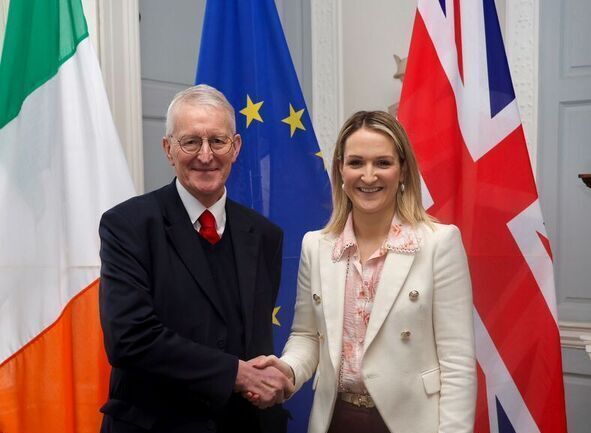Former Republican politician Joe Scarborough has warned that America is becoming like Hungary and Poland, thanks to his former party. NBC NEWS
Between the Lines / By Peter McDermott
The Washington Post’s Siobhán O’Grady reported a couple of hours after the Trumpist mob invasion of the Capitol on reaction from governments overseas. Taoiseach Micheál Martin was among those democratic leaders who expressed horror at what happened on Jan. 6. It was notable, however, that authoritarian countries played a game of two-sidism.
Consider Venezuela, which said that “the political polarization and the spiral of violence …reflects the profound political and social crisis the United States is currently experiencing.”
Turkey “urged all parties in the U.S.A. to show restraint and common sense.”
Russia inevitably called out America’s “hypocrisy”; the whole rationale of interfering in the U.S. election process and sowing dissension generally has been precisely to put Moscow in a position to make such a charge.
One leading political philosopher would not be surprised with any of this. Jan-Werner Müller in his book “What is Populism?” explicitly ties Trumpian ideology to the prevailing ideas in Russia, Turkey, Poland and Hungary (the last two joined the EU as democratic countries but have done a lot of back-sliding of late with regard to constitutional norms), as well factions or movements with a sizable base like France’s Front National and the Five-Star Movement in Italy.
You could say that they are fascism lite, whereas the left-wing version in Venezuela is Stalinism lite, and also applies to individual Latin American politicians, such as President Andres Manual Lopez Obrador, who after a failed bid some years ago maintained he was “the legitimate president of Mexico.” (Venezuela’s opposition leader Juan Guaidó, in contrast, on Jan. 6, according to O’Grady’s report, said the “attack on the Capitol was an attack on democracy. My thoughts are with the citizens and officials who feel the roots of their country were attacked.”)
A friend in Ireland emailed me a Boston Review article back in late October 2016, entitled “Real Citizens.” He has four children but somehow has always managed to keep up with what’s being said in the world of politics. “Essential reading,” he said of the essay, which was by Müller. “In fact anything by this guy is recommended.”
And it really struck a chord and I sent it on to some Americans who were impressed with this German-born Princeton professor of politics, who had nailed exactly what was happening with the rise of Trump.
He wrote that of the the many “offensive and demonstrably false things [Trump said] during the last year …one especially revealing sentence went virtually unnoticed. At a rally in May he declared, ‘The only important thing is the unification of the people, because the other people don’t mean anything.’
“Some people mean something; others don’t. This is a politics predicated on identity, defined mainly by exclusion,” continued Müller. “Who exactly gets excluded and how—whether Mexicans by way of a wall or Muslims by way of a religious test—can vary from day to day, but the fundamental logic is always the same. There is a real America, Trump knows what it is, and whoever does not agree does not belong—and is implicitly opposed to making America great again.”
I bought and read “What is Populism?” and in turn recommended it to another friend back home in Ireland, who was put off and confused by the use of such a general, anodyne term to describe creeping authoritarianism.
People tend to identify positively with the Populists of turn of the century America, its social democratic program, and William Jennings Bryan, the thrice-failed presidential candidate for the Democrats. Try to imagine someone who is part Bernie Sanders and part televangelist, as Bryan’s other major claim to fame was as the lawyer who represented the fundamentalist side in the Scopes trial of 1925.
However, Müller says that the Populists “rarely ever claimed to be the people as such…,” unlike the modern populists he’s talking about.

Secondly, people tend to associate populism with the appeal to prejudice over principle. Let’s take Éamon de Valera’s Fianna Fáil backing in 1931 the local complaints from people in Mayo when a Protestant woman was appointed librarian. Surely it shouldn’t have mattered according to republican ideals what her religion was? But this did not mean that Fianna Fail was being anti-democratic.
De Valera, a one-time revolutionary, benefited from the constitutional system: in 1932, his former opponents in civil war allowed a change of government, even though they were firmly in control of the army and police.
He subsequently ruled over what Müller would call an “illiberal democracy” — but a constitutional democracy it was, nonetheless. Dev went into the opposition benches twice, in 1948 and 1954, for three-year periods. Twenty-seven years after first being elected head of government, he resigned to take up the more ceremonial position of president. Likewise the anti-Catholic prejudice of a Bryan or a unionist politician in Northern Ireland might fit this type of “illiberal democracy,” yet still operated within a constitutional system.
For Müller, modern populism is a “degraded form of democratic rule,” which threatens democracy and is indeed anti-democratic. Citing a like-minded theorist, he says democrats know that their claims to represent the people are “self-limiting” and are “conceived as fallible.” He writes, “In some sense, they’d have to subscribe to Beckett’s famous words in ‘Westward Ho’: “Ever tried, ever failed. No matter. Try again. Fail again. Fail better.’
“Populists, by contrast, will persist with their representative claim no matter what; because the claim is of a moral and symbolic — not an empirical — nature, it cannot be disproven.”
We could say that the 147 Republican members of Congress and eight senators who voted not to certify on Jan. 6 truly constitute the populist wing of the Republican Party. They are post-truth and post-evidence. They’ve gone along with the baseless claims of a stolen election, and thus undermined the legitimacy of American institutions.
In fact, they don’t really believe it was stolen in any literal sense. It’s just a means to an end, which is that Joe Biden and Kamala Harris can’t be president and vice-president for “real Americans.”
Newly elected Rep. Lauren Boebert of Colorado was in the news leading up to the Jan. 6 day of certification because of a dispute over how and in what circumstances she could carry her Glock pistol in Washington. She said that in the “Real America” people did things differently. Boebert was one of the populist post-truth 147, plus eight, and in a speech on the floor of the House, post-insurrection, said it was her “separate but equal obligation” to raise objections to the certification. Interesting phraseology, “separate but equal,” as that was the doctrine that was a legal fig-leaf allowing segregation, which of course was almost never equal.
In this regard, it’s worth noting that Müller is not alone in seeing George Wallace as the right-wing authoritarian forerunner to Trump. He, too, claimed to speak for “real Americans,” just as Nigel Farage said that the Brexit vote was a “victory for real people.”
Richard Barnett who was pictured in Nancy Pelosi’s chair on Jan. 6 when once asked if he was a white nationalist said that yes, he was white, that he was a nationalist, and that anyone who wasn’t a nationalist. “Could the get the f…out of my country!”
The real America, the Christian-nationalist “majority,” want Trump or someone like him to be leader. In that sense, the election was stolen on them.
This explains, for Müller, the dispute over Obama’s birth certificate, as the president managed to embody “the ‘bicoastal elite’ and the African American Other, neither of which really belongs to the United States proper.”

Gov. George Wallace.
For populists, “the people themselves” is a “fictional entity outside existing democratic procedures, a homogenous and morally unified body whose alleged will can be played off against actual election results in democracies.”
“Populists assume that ‘the people’ can speak with one voice and issue something like an imperative mandate that tells politicians exactly what they have to do in government,” as opposed to a free mandate, according to which representatives have to use their own initiative.
The populists distinguish between the “morally correct” outcome of a vote to the actual empirical result of an election. For instance, Hungary’s Viktor Orbán declared in 2002 when he lost that “The nation cannot be in opposition.” Likewise the Tea Party claimed President Obama was “governing against the majority.” And Müller reminds us that Donald Trump alleged the Republican primaries were rigged against him.

Hungarian Prime Minister Viktor Orbán: "The nation cannot be in opposition."
PHOTO: EUROPEAN PEOPLE’S PARTY
He says that the “problem is never the populist’s imperfect capacity to represent the people’s will; rather it’s always the institutions that somehow produce the wrong outcomes. So even if they look properly democratic there must be something going on behind the scenes that allows corrupt elites to continue to betray the people.”
Populists, though, aren’t against elites, just those elites who don’t agree with them. A more important characteristic of populism is its anti-pluralism, according to Müller.
And increasingly people are agreeing with this analysis. MSNBC host and former Republican congressman Joe Scarborough has compared trends in the United States with those in countries like Hungary and Poland.
Russia-American author Masha Gessen has said that the GOP has turned into an autocratic party under Trump, whose presidency has endangered American democracy.
Meanwhile, the former Republican strategists like Rick Wilson and Steve Schmidt grouped around the Lincoln Project have claimed a key role in defeating Trump and replacing him with Joe Biden, in the name of saving the American system. They argue that the broadest possible alliances — from the left wing of the Democratic Party to former Republicans — will need to be constructed if autocracy is to be defeated in this country.









